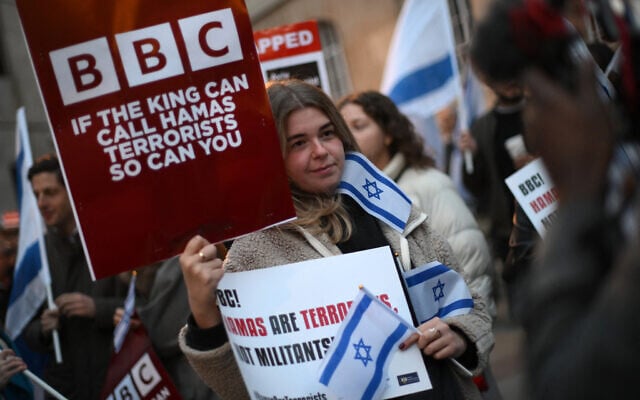
Samer Elzaenen has appeared on the channel several times reporting on the conflict
| Published April 27, 2025
UK broadcaster attempts to distance itself from Samer Elzaenen, who has said shooting Jews ‘fixes everything,’ stating that he isn’t a staff member while disavowing antisemitism
A Gaza-based journalist named Samer Elzaenen, who has appeared on BBC Arabic since the onset of the Gaza conflict in October 2023, has come under scrutiny following the resurfacing of antisemitic social media posts. In a 2011 Facebook post, Elzaenen wrote: “We shall burn you as Hitler did, but this time we won’t have a single one of you left.” He also praised over 30 attacks on Israeli civilians, referring to perpetrators as “heroes” and “martyrs.”
According to the British newspaper, Elzaenen has praised over 30 separate terror attacks against Israeli civilians, including a February 2023 car-ramming attack that killed two boys and a 20-year-old man in Jerusalem.
The victims, he said at the time, “will soon go to hell.”
In the aftermath of the October 7 assault, in which some 1,200 people were killed, mostly civilians, and 251 were seized as hostages, Elzaenen praised the Hamas “resistance fighters” who led the onslaught.
The BBC has stated that Elzaenen is not a staff member but a freelance contributor, and they were unaware of his social media activity prior to his appearances on air. The broadcaster emphasized its commitment to impartial journalism and disavowed antisemitism.
This incident adds to ongoing concerns about bias within BBC Arabic. In March 2025, UK Conservative leader Kemi Badenoch called for reforms to the channel, citing accusations of antisemitism and anti-Israel bias. The Committee for Accuracy in Middle East Reporting and Analysis (CAMERA) has criticized BBC Arabic for allegedly providing a platform to extremists and presenting biased views unchallenged.
 Illustrative: Protesters holding placards and Israeli flags join a gathering outside the headquarters of the BBC (British Broadcasting Corporation) in London on October 16, 2023, to appeal to the corporation to call Hamas ‘terrorists.’ (Daniel Leal/AFP)
Illustrative: Protesters holding placards and Israeli flags join a gathering outside the headquarters of the BBC (British Broadcasting Corporation) in London on October 16, 2023, to appeal to the corporation to call Hamas ‘terrorists.’ (Daniel Leal/AFP)
The controversy has intensified debates about the BBC’s editorial standards and its role in reporting on the Israel–Hamas conflict. Media watchdogs and political figures are urging the broadcaster to address these issues to maintain credibility and uphold journalistic integrity.
Overall Takeaway
The controversy surrounding Samer Elzaenen’s antisemitic social media posts and his appearances on BBC Arabic highlights significant challenges for media outlets in maintaining editorial integrity and impartiality. The incident has raised concerns about bias in reporting on sensitive topics like the Israel–Hamas conflict and has intensified calls for greater scrutiny of freelance contributors. As pressure mounts on the BBC to address these issues, the broader media landscape may face increasing demands for accountability in handling contributors with extremist views. This controversy also underscores the growing need for social media vetting in journalism, particularly for those involved in high-profile international platforms, as the line between personal beliefs and professional responsibility becomes harder to ignore.





Be the first to comment